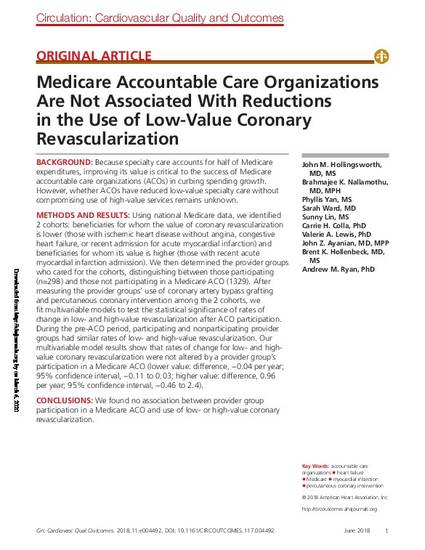
- Health care delivery,
- Health services administration
BACKGROUND:
Because specialty care accounts for half of Medicare expenditures, improving its value is critical to the success of Medicare accountable care organizations (ACOs) in curbing spending growth. However, whether ACOs have reduced low-value specialty care without compromising use of high-value services remains unknown.
METHODS AND RESULTS:
Using national Medicare data, we identified 2 cohorts: beneficiaries for whom the value of coronary revascularization is lower (those with ischemic heart disease without angina, congestive heart failure, or recent admission for acute myocardial infarction) and beneficiaries for whom its value is higher (those with recent acute myocardial infarction admission). We then determined the provider groups who cared for the cohorts, distinguishing between those participating (n=298) and those not participating in a Medicare ACO (1329). After measuring the provider groups’ use of coronary artery bypass grafting and percutaneous coronary intervention among the 2 cohorts, we fit multivariable models to test the statistical significance of rates of change in low- and high-value revascularization after ACO participation. During the pre-ACO period, participating and nonparticipating provider groups had similar rates of low- and high-value revascularization. Our multivariable model results show that rates of change for low- and high-value coronary revascularization were not altered by a provider group’s participation in a Medicare ACO (lower value: difference, −0.04 per year; 95% confidence interval, −0.11 to 0.03; higher value: difference, 0.96 per year; 95% confidence interval, −0.46 to 2.4).
CONCLUSIONS:
We found no association between provider group participation in a Medicare ACO and use of low- or high-value coronary revascularization.

© 2020 by the authors. Licensee © American Heart Association, Inc.. This article is an open access article distributed under the terms and conditions of the Creative Commons Attribution (CC BY) license (http://creativecommons.org/licenses/by/4.0/).
*At the time of publication Sunny C. Lin was affiliated with the University of Michigan